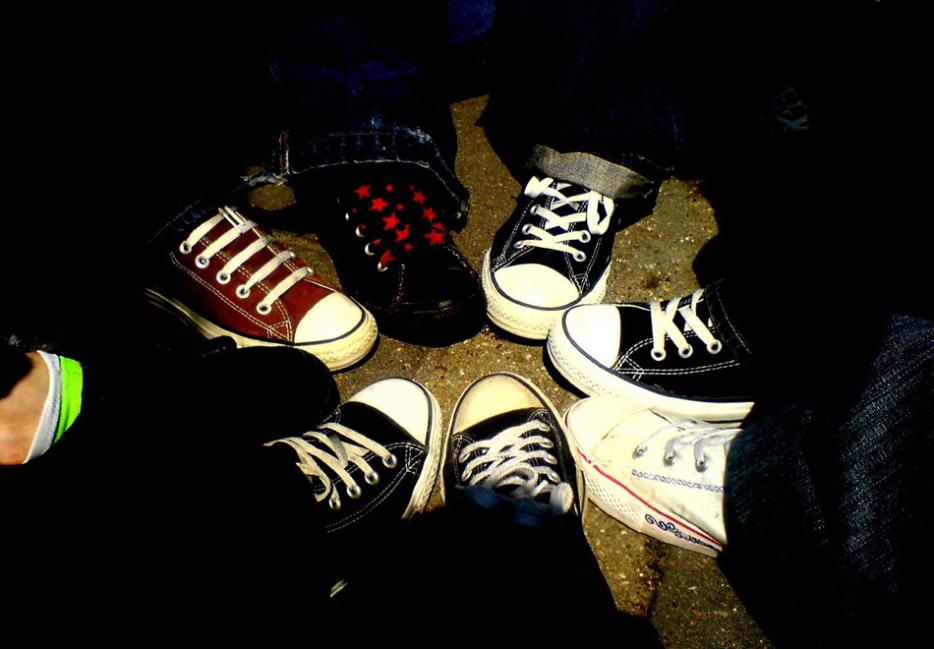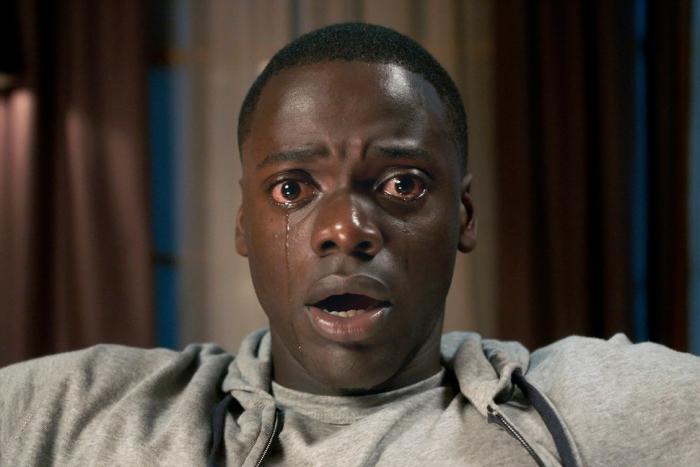Long Island’s garages and basements birthed many an emo band. Brand New, Straylight Run, Taking Back Sunday—a collection of local acts—aired the grievances that come with being cooped up in cul-de-sacs, and emo’s rise in popularity on Long Island overlapped with my pubescent coming-of-age there—and with the most difficult years of my life. At 12, my newfound obsession with New Found Glory coincided with my mom’s diagnosis of late-stage lung cancer, and my dad’s recurrence of prostate cancer. When my parents were sick and after they died—Mom a few months after her diagnosis, Dad two years after Mom—I took solace in emo’s overblown feelings. The angst-drenched music I blasted through the headphones of my Sony Walkman allowed me to access the intensity of my grief.
The lyrics to Brand New’s “Okay I Believe You, But My Tommy Gun Don’t” climbed up the front of my binder in ninth grade. On that track, Jesse Lacey’s voice grew from a whisper to a yell over an electric guitar’s strum: “Holding onto your grudge / Oh it’s so hard to have someone to love / And keeping quiet is hard / ‘Cause you can’t keep a secret if it never was a secret to start.” The summer after my dad died, Straylight Run’s “It’s For the Best” captured my premature sense of being grown up, and it still does now: “And I know much more than I did back then / But the more I learn, the more I can’t understand.” The end of sophomore year was steeped in Bright Eyes’ eerie “We Are Nowhere and It’s Now.” When I turned 17, I listened exclusively to Brand New’s The Devil and God Are Raging Inside Me at full blast on my car stereo for weeks, relishing Lacey’s new visceral howl.
Emo was how my brother John and I bonded in our loss. We did not talk about what had happened to our family, but we sang along to songs that talked about it for us. The song that spoke to both of us the most then was Brand New’s “Guernica,” in which Lacey pleads for the life of a dying relative: “If I could I would shrink myself / Sink through your skin to your blood cells / Remove whatever makes you hurt, but I am too weak to be your cure.” Even now, “Guernica,” which oscillates between soft-spoken verses and a power-chorded, manic chorus, seems an appropriate representation of the mix of placidity and hysteria I actually felt when my parents were sick.
Back then, I fought to stay placid on the surface; I felt like I had to keep it together. My extended family did not explicitly discuss the seriousness of my parents’ conditions, let alone the emotional turmoil they caused. I felt that everything was so tenuous that letting grief overtake me would have tipped the scales into chaos. My veneer of normalcy was so polished that when my brother’s therapist asked me how I was at my father’s wake, I responded with, “I’m fine.” She took me by the shoulders, looked in my eyes, and said, “No, you are not fine.”
I valued emo music because it allowed me a way to not keep it together. When I listened to emo, sang along at shows, or replayed lines, like The Early November’s “It’s never been harder to fall / there’s nothing to grab and that’s all I want to hold onto,” in my head over and over again, I allowed myself to truly feel. The melodrama of emo did not seem melodramatic to me—it expressed exactly the heartbreak I felt, at exactly the pitch I felt it. Those overwrought, heart-on-your-sleeve lyrics; those screams and whines; those blaring power chords were the outward expressions of the anguish I kept tamped down.
Like many former emo kids who soothed rough patches with a dose of Saves the Day, I’ve grown up. My grief no longer feels like a fresh wound that is only safe to unbandage while wearing headphones. But I still listen to emo. While riding the subway, I queue up albums from 1999, 2001, 2003—The Get Up Kids’ Something to Write Home About, Saves the Day’s Stay What You Are, Brand New’s Deja Entendu. Ask me what my favorite album is, though, and I probably won’t name an emo record—unless I know you’re a safe confessor because you still listen to emo, too.
Why do I feel like still listening to emo is something shameful to admit? I’m not embarrassed to say that when I was nine I plastered an entire wall of my bedroom with pictures of the Backstreet Boys, so why am I loath to confess to moshing at a My Chemical Romance concert in 2004—even if that concert was eleven months after my dad died and allowed me a measure of catharsis? I’m not a teenager facing devastating loss anymore, so why am I still drawn to this music that airs overblown feelings?
*
Emo is the label that no one wants for their music. A diminutive of “emotional,” it connotes whining, melodrama, self-indulgence. It even sounds like a taunt, and it’s supposed to. Speaking to the label’s origins, Tom Mullen, founder of the website and its eponymous podcast Washed Up Emo, says that “the term has always been, starting in the 1980s, a way to call something wimpy or lame…the bands that weren’t heavy enough or took a more quiet approach were called emo.”
Emo grew out of hardcore punk in the 1980s in Washington, D.C.; it was originally shorthand for “emocore,” itself a shortening of “emotive hardcore,” meaning hardcore that focused on personal rather than political feelings. Where Minor Threat, founded in 1980 in D.C., raged with a decidedly political bent, Rites of Spring, formed by teenage Minor Threat fans in 1984, took that disillusionment and turned it inward, making for the beginnings of the genre. As critic Andy Greenwald explains in his 2003 book Nothing Feels Good: Punk Rock, Teenagers, and Emo,“With Rites of Spring, the goal was no longer to shake your fist at the injustices of the world, it was to shake yourself.” Rites of Spring only played a handful of shows in the D.C. area, but during that period they tapped into what Greenwald calls an “eager[ness] to convert private pain into public purging.” The band got called “emo” by people making fun of their weepy fanbase.
Even still, Mullen says, emo continues to undergird a community. He founded Washed Up Emo in 2007 because he felt that the genre’s origins were being supplanted by bands getting attention on MTV and Fuse, bands that wore guyliner and skinny jeans (e.g. My Chemical Romance). Mullen’s website and podcast celebrate both the early days of emo—bands like The Promise Ring—and the current fourth-wave emo revival. He also started Emo Night NYC, a DJ series that brings together fans to revel in nostalgia—though Mullen regrets that there has been too much of a focus on third-wave, mid-2000s bands at these nights, playing into the sense that “the genre is scene as a punchline, with cracks about the clothes and party atmosphere, and zero understanding of the older bands that led to this.”
Back in 2003, Greenwald defined emo as “a specific sort of teenage longing, a romantic and ultimately self-centered need to understand the bigness of the world in relation to you… Emo is about as specific as adolescence and lasts about as long.” In this line of thinking, emo is solipsistic, nostalgic, and sentimental, encapsulating the heightened emotions of adolescence, when nothing feels good. Via email, Greenwald explained why bands want to repudiate the emo label but fans embrace it: “It’s an essentially lame and derogatory name that no bands want anything to do with. And yet everything it represents is quite meaningful to fans, as it somehow captures a sort of adolescent emotional electricity that can be received from bands and songs but also more ephemeral sources like blog posts, texts, concerts, or summers.”
*
Tom Mullen believes that “the ethos or mantra of emo is honesty.” This makes me think of the vulnerability of my formerly favorite emo songs, the sense that tuning into Taking Back Sunday’s “…Slowdance on the Inside,” hearing Adam Lazzara’s voice erupting into rawness on the chorus—“So cross my heart and hope to / I’m lying just to keep you here / So reckless (so reckless) / So thoughtless (so thoughtless) / So careless, I could care less”—is like opening a diary.
But those lyrics are not raw, honest, or even authentic. They’re polished and dramatized, words that are “at best worse than teenage poetry,” to borrow a line from another Taking Back Sunday song. The lyrics are also sentimental, leaning heavily on cliché (“cross my heart and hope to”), and melodramatic, especially in the breakdown: “This glass house is burning down / You light the match, I’ll stick around.”
Mullen would almost certainly object here and say that Taking Back Sunday is part of the mid-2000s trend that gave emo a bad name, not the version of the genre that is undergirded by honesty. But if I’m being honest, I was the kind of emo fan who didn’t know about the genre’s origins when I was a teen, who wasn’t all that interested in bands like Sunny Day Real Estate.
And I’m still not, because my attachment to emo is a perverse sort of nostalgia for the years of my life when I couldn’t bring myself to talk about my parents because I was afraid of slipping into a chasm of despair. Emo helped me to enter that despair on my own terms.
In the decade-plus since my parents died, my loss has become less raw; I no longer need listen to music at the highest decibels in order for me to hear my own heartache. But I still value those old albums because they keep me in touch with the times when everything was unprocessed. Part of me fears that if I forget the intensity of my initial mourning, I will forget my parents—if I allow myself to keep moving forward, going through the day-to-day of life without feeling that grief, I will forget the two defining moments of my life, when my parents left this Earth.
And I suppose that is a sort of desire for arrested development, a wanting to live in the past. It’s nostalgic, and nostalgia can be dangerous. Nostalgia is also, as Greenwald put it to me, “a very powerful drug.”
In The New Yorker last fall, Jia Tolentino wrote about emo dance nights and the potency of nostalgia among former emo-loving teenagers who are now “grown up, sort of” and “are re-immersing themselves in the sound of adolescence—that squeal of medical-grade angst and longing… [Emo nights] are oddly specific celebrations of near-term nostalgia in which music made to help teen-agers flail their way to adulthood provides an opportunity for adults to succumb to the histrionics of teendom again.” The appeal of emo nights lies in the fact that, as Greenwald says, “we never love music as much as we do when we’re teenagers, it’s a high we’re always chasing.”
By chasing that high, it could be said that adults are allowing themselves to be overtaken by feelings they should have left behind. The nostalgic draw of emo, then, is tied to the sentimentality and melodrama that made the genre so irresistible to teens, and what makes it embarrassing for adults. The extravagant feelings of emo are too easy; adults should work harder, listen to music that is sparse, clear-eyed. Or, at least, listen to music that doesn’t include lines like Dashboard Confessional’s cloying “My hopes are so high that your kiss might kill me / So won’t you kill me / So I die happy?”
Sentimentality presents not just an aesthetic dilemma but an ethical one: it traffics in clichés that assume the universal truth of an emotional experience. Sentimentality manipulates, giving cues to the listener as to how to feel, how to react. When I was 14 and listening to Dashboard Confessional’s “Hands Down” over and over again, I thought that falling in love was meant to feel like giving away my heart for someone “to fill or burst / to break or bury / or wear as jewelry.” Sentimentality promises easy redemption: getting over a heartache is as easy as taking cues from New Found Glory’s poppy anthem “My Friends Over You.”
Melodrama, on the other hand, may be theatrical and exaggerated, but it owns its extremity, to a degree. It’s still in bad taste, though—I would be mortified to be caught wearing the old Chuck Taylors that I tattooed with Taking Back Sunday’s histrionic lyrics nowadays.
Even though indulging in emo means indulging in what Tolentino called “the histrionics of teendom,” when I listen to Taking Back Sunday, I do not become the teenager I once was—I can never fully access that girl again. Still, emo helps me mark the distance between the different selves I have inhabited.
Writer Briallen Hopper—whose take on another taboo-for-adults genre, the YA novel (in particular, John Green’s The Fault in Our Stars) broke the Los Angeles Review of Books website—explains why overcoming that distance is necessary. A teenager’s perspective is not less valid because it comes before an adult’s—in fact, a teenager’s view on life can guide you “when you are living through an extreme experience,” Hopper told me. “Much of the time you need detachment and analytical distance through forms like critical analysis or irony, but sometimes you need an emotional form like melodrama that’s more like a waterslide—a certain kind of guided, wild ride; a little scary, a little exhilarating, but not too unsafe, with the end in sight.” Emo still provides me with that waterslide, a safe way to confront the loss of my parents.
*
The sentimentality and melodrama of emo music can be beneficial to surrender to, but we fear doing so. “Saccharine is our sweetest word for fear: the fear of too much sentiment, too much taste,” Leslie Jamison writes in the opening to her essay “In Defense of Saccharin(e),” a consideration of intense feeling and artificial sweetener. “When we hear saccharine, we think of language that has shamed us, netted our hearts in trite articulations: words repeated too many times for cheap effect, recycled ad nauseum.” We are afraid and ashamed of emotions “unmediated by nuance.”
That fear arises not just because sentimentality and melodrama are juvenile, but because they are base. Jamison writes: “We want to dismiss sentimentality, to assert that instead our emotional responses are more sophisticated than other people’s, that our aesthetic sensibilities testify, iceberg style, to an entire landscape of interior death.” This is why we deny listening to bands like Brand New, because we wish to “construct ourselves as arbiters of artistry and subtlety.”
In another essay, “Grand Unified Theory of Female Pain,” Jamison traces the trope of the wounded woman from Victorian novels to Tori Amos album, writing about how female pain in particular has come to be seen as a cliché, and about women who try desperately to evade that cliché: “They are wary of melodrama so they stay numb or clever instead. Post-wounded women make jokes about being wounded or get impatient with women who hurt too much.”
In college, I realized that outwardly admitting my love for emo would mark me as a wounded woman, but I would still listen all the time through Apple headphones. I recall a set of months in 2009 when I would replay Kevin Devine’s song “You’ll Only End Up Joining Them” on repeat, hitting the back button before the last note of the song had ended so I could hear it on a continuous loop. I loved the song—still do—both for its acoustic, folksy sound and for Devine’s verbosity. “You’ll Only End Up Joining Them” tells a story, moving through depression (“And I can’t say that it’s a sickness / More like a stranger I ask in / And later realize was a strangler / slipping nooses in my den”) to a realization (“Don’t kill yourself to raise the dead / It never works, you’ll only end up joining them”). I needed to hear that story then, to go through those lows and highs along with the song.
Jamison was the one who made me remember those marathon sessions of Kevin Devine. She told me about her own song of choice to push replay on when she was 22 and was “thinking about a breakup”—Tom Petty’s “Don’t Come Around Here No More.” “Sometimes listening to a sad song can become a way of pushing on a bruise, staying stuck in a feeling or stuck in a certain groove of thinking about a feeling,” she said. It’s a version of the “wound dwelling” she writes about in “Grand Unified Theory of Female Pain,” and it’s this aspect of “wound dwelling” or “pushing on a bruise” that can make listening to emo seem shameful and narcissistic. It’s indulging in a certain kind of static self-pity that, once again, can seem to allow for regression rather than growth.
But Jamison notes that there’s another kind of wound-dwelling that listening to music can offer, “something that honors the depth and legitimacy of feeling but also involves constant evolution in how you’re relating to the feeling; that’s not standing still.” When I listened to “You’ll Only End Up Joining Them” on repeat, I felt that movement, that shift in my emotions. When I listen to it now, the shift is compounded—the lyrics carry me through three evolutions at once: Devine’s own emotional journey, my need to be taken along on that journey in 2009, and how I have ended up on the other side of that journey now.
Listening to emo doesn’t just serve as a way to recapture what Greenwald called “adolescent emotional electricity.” It lets me feel that electricity surge on and off, to see a little more clearly where I’ve been and where I am now, and how that distance isn’t so far to overcome.






